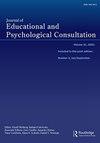Development and Examination of a Trainee-Led ECHO Autism Network for Rural Healthcare Providers
IF 1.1
4区 心理学
Q4 PSYCHOLOGY, EDUCATIONAL
Journal of Educational and Psychological Consultation
Pub Date : 2022-12-05
DOI:10.1080/10474412.2022.2151013
引用次数: 0
Abstract
ABSTRACT Rural healthcare providers face numerous challenges in caring for autistic individuals. Some of the most common obstacles to optimal services include lack of specialized training and expertise, resources, and collaborators, as well as large physical distances between providers and those they serve, region-specific cultural factors, and others. Recent methodologies, such as Extensions for Community Healthcare Outcomes (ECHO), use videoconferencing technology to connect subject-matter experts with community providers to remediate disparities in 1) provider access to knowledge and consultation relevant to evidence-based practices (EBP) and, thereby, 2) patient access to quality care. Despite such advances, few projects have targeted rural communities in the same geographic area as network personnel. Additionally, to date, ECHO networks have been staffed with senior personnel, who have provided their experience and expertise to attendees. We, a multidisciplinary group of trainees and faculty, developed and piloted an ECHO Autism network for healthcare providers across the rural Western United States. In preparation for the launch of this network, trainees polled prospective participants regarding their disciplines and interests. Then, ECHO sessions were developed and implemented over several months. Finally, attendees provided feedback about their experiences. We report information regarding each of these phases and initial results of the post-session feedback to assist those who desire to develop a similar network in their area, and to provide preliminary examination (i.e., formative evaluation) of its benefit in view of the needs of rural providers caring for autistic individuals. We posit that our trainee-led model has unique value for cost-effectiveness and sustainability of implementation.农村医疗保健提供者以实习生为主导的ECHO自闭症网络的发展和检验
农村医疗保健提供者在照顾自闭症患者方面面临着许多挑战。实现最佳服务的一些最常见障碍包括缺乏专门培训和专业知识、资源和合作者、提供者与其服务对象之间的物理距离大、特定地区的文化因素等。最近的方法,如扩展社区医疗保健成果(ECHO),使用视频会议技术将主题专家与社区提供者联系起来,以弥补以下方面的差距:1)提供者获得与循证实践(EBP)相关的知识和咨询,从而2)患者获得高质量的护理。尽管取得了这些进展,但很少有项目以网络人员所在地理区域的农村社区为目标。此外,迄今为止,ECHO网络配备了高级人员,他们向与会者提供了他们的经验和专业知识。我们,一个由学员和教师组成的多学科小组,为美国西部农村的医疗保健提供者开发和试点了一个自闭症回声网络。为了筹备这个网络,学员们就他们的学科和兴趣对未来的参与者进行了民意调查。然后,在几个月的时间里,制定和实施了ECHO会议。最后,与会者提供了他们的经验反馈。我们报告每个阶段的信息和会后反馈的初步结果,以帮助那些希望在他们所在地区建立类似网络的人,并根据照顾自闭症患者的农村提供者的需求,对其效益进行初步检查(即形成性评估)。我们认为,我们以学员为主导的模式在成本效益和实施可持续性方面具有独特的价值。
本文章由计算机程序翻译,如有差异,请以英文原文为准。
求助全文
约1分钟内获得全文
求助全文
来源期刊

Journal of Educational and Psychological Consultation
PSYCHOLOGY, EDUCATIONAL-
CiteScore
3.40
自引率
23.50%
发文量
20
期刊介绍:
The Journal of Educational & Psychological Consultation (JEPC) provides a forum for improving the scientific understanding of consultation and for describing practical strategies to increase the effectiveness and efficiency of consultation services. Consultation is broadly defined as a process that facilitates problem solving for individuals, groups, and organizations. JEPC publishes articles and special thematic issues that describe formal research, evaluate practice, examine the program implementation process, review relevant literature, investigate systems change, discuss salient issues, and carefully document the translation of theory into practice.
 求助内容:
求助内容: 应助结果提醒方式:
应助结果提醒方式:


